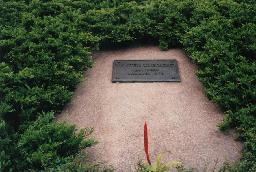Ulbricht, Walter |
| STATESMAN (GERMANY) |
|
BORN 30 Jun 1893, Leipzig, Sachsen - DIED 1 Aug 1973, Groß Dölln, Brandenburg (near Berlin) GRAVE LOCATION Berlin: Städtischer Zentralfriedhof Friedrichsfelde, Gudrunstrasse, Lichtenberg (Gedankstätte der Sozialisten (ashes)) |
|
Walter Ulbricht served in World War I on the Eastern Front from 1915 to 1917. He was against the war and deserted from the army in 1917. He was taken prisoner in Charleroi and released during the German revolution of 1918. In 1920 he joined the KPD, the German Communist Party. In 1924/1925 he studied in Moscow. From 1928 to 1933 he was a member of the Reichstag for South Westphalia. In 1931 he ordered the killing of two Berlin police officers (Erich Mielke was on of he killers). In 1932 the Russians told the Communists to cooperate with the nazis and he supported the strike of the transport workers in Berlin. After the nazis gained power in 1933 he succeeded Ernst Thälmann as leader of the party (after he had some competitors killed in Moscow). He lived in Prague until 1937 and in the Soviet Union until 1945. In 1945 he returned to Germany where he reorganized the Communist Party according to Stalin's rules, resulting in the Sozialistische Einheitspartei Deutschlands (SED). In 1950 he became General Secretary of the Central Committee of the SED. After President Wilhelm Pieck died in 1960 the presidency was abandoned and Ulbricht became the leader of the country. In 1968 he supported the invasion of Czechoslovakia. His attempts to reform the economy largely failed. Bad relations with Brezhnev led to his fall in 1971. He died two years later. Related persons • cooperated with Apel, Erich |
| Images |
Sources • Havel, Walter, Wer ist Wer?, Das Deutsche Who's Who, Arani Verlag, Berlin, 1965 • Hoffmann, Joachim, Berlin Friedrichsfelde, Ein Deutscher Nationalfriedhof, Das Neue Berlin, Berlin, 2001 • Walter Ulbricht - Wikipedia (EN) |



